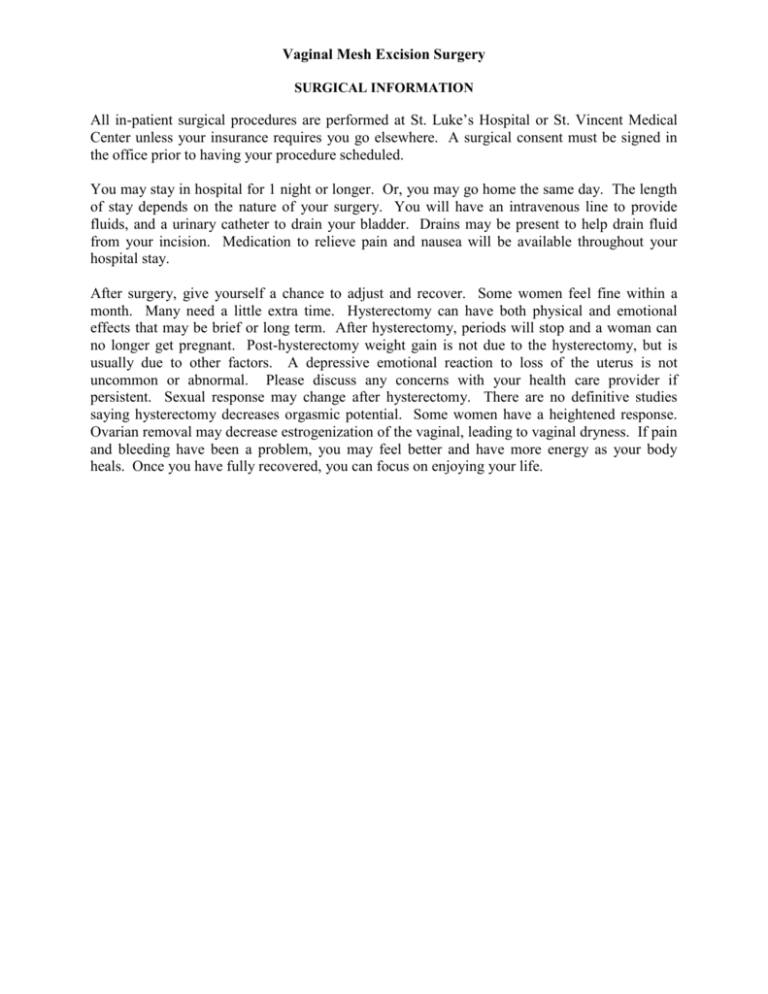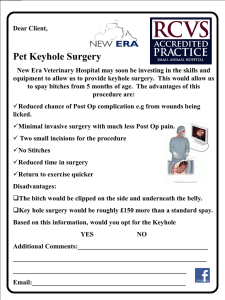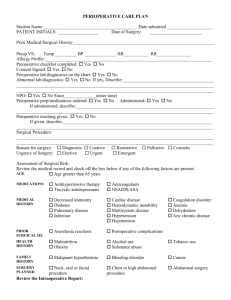Mesh Excision
advertisement

Vaginal Mesh Excision Surgery SURGICAL INFORMATION All in-patient surgical procedures are performed at St. Luke’s Hospital or St. Vincent Medical Center unless your insurance requires you go elsewhere. A surgical consent must be signed in the office prior to having your procedure scheduled. You may stay in hospital for 1 night or longer. Or, you may go home the same day. The length of stay depends on the nature of your surgery. You will have an intravenous line to provide fluids, and a urinary catheter to drain your bladder. Drains may be present to help drain fluid from your incision. Medication to relieve pain and nausea will be available throughout your hospital stay. After surgery, give yourself a chance to adjust and recover. Some women feel fine within a month. Many need a little extra time. Hysterectomy can have both physical and emotional effects that may be brief or long term. After hysterectomy, periods will stop and a woman can no longer get pregnant. Post-hysterectomy weight gain is not due to the hysterectomy, but is usually due to other factors. A depressive emotional reaction to loss of the uterus is not uncommon or abnormal. Please discuss any concerns with your health care provider if persistent. Sexual response may change after hysterectomy. There are no definitive studies saying hysterectomy decreases orgasmic potential. Some women have a heightened response. Ovarian removal may decrease estrogenization of the vaginal, leading to vaginal dryness. If pain and bleeding have been a problem, you may feel better and have more energy as your body heals. Once you have fully recovered, you can focus on enjoying your life. RELEASE OF LIABILITY By signing this form, I _______________________________ recognize that Dr. Croak and his office will do their best to treat my surgically complex issues to the best of their abilities. I understand that despite Dr. Croak’s best efforts to address my issue, I may still have problems and or complications regarding the mesh placed in my vagina elsewhere and its subsequent removal by Dr. Croak. These suboptimal outcomes include but are not limited to continued erosions of retained mesh that are not able to be safely removed, pain, infection, bleeding, injury to the bladder or bowel with resultant need for further surgery, fistula (connection between the bladder/bowel to vagina), painful intercourse, or death. Patient Initials:____________ Dr. Croak and his staff are released of any and all liability by me or any and all related parties for undertaking my surgical case in the event of a suboptimal or catastrophic outcome, considering a surgical repair of my problem may be potentially risky. I confirm that Dr. Croak has the right per his office policy to terminate our physician-patient relationship as he sees fit if I have commenced or are planning to commence legal proceedings towards the company producing the mesh and/or physician/ healthcare provider/s who initially placed/cared for the vaginal mesh out of frustration with my surgical outcome. I fully understand that although Dr. Croak is sympathetic to and can appreciate my frustration, his practice cannot tolerate legal threats or lengthly depositions, court dates, or legal requirements of his time if he is to care for me. Any such investment of his time by my attorney/s shall be paid in full per his customary fee schedule. I understand that any such threats of litigation made towards Dr. Croak or his staff, whether by my attorney/s or a defendant attorney, despite Dr. Croak’s best efforts to help me, will result in immediate dismissal from his practice. Patient Initials:_____________ I understand the nature of this form and am signing this form under no duress or confusion. Signature:_______________________________________________ Witness:________________________________________________ Date:___________________________________________________ Before Surgery * For surgery scheduled at St. Lukes Hospital, pre-admission testing will be scheduled for you. Your tests may include blood work, a urinalysis, chest x-ray, electrocardiogram and pregnancy test. * If MRSA positive, please refer to the MRSA protocol below to obtain appropriate preoperative therapies to use before your surgery. * The anesthesiologist will talk with you at the time of your testing regarding the specific type of anesthesia that will be administered. Inform the anesthesiologist if you wear dentures, or have a family history of anesthetic complications. He/she or one of the personnel in the outpatient testing will tell you what time to report to the out-patient admitting office the day of your scheduled surgery. * Do not bring jewelry or valuables with you to the hospital. * Stopping smoking before surgery if strongly encouraged. One Day Prior to Surgery * Please refer to the bowel prep protocol attached. Please Follow a Clear Liquid Diet starting at 4:00 PM the Day Before Surgery. You may have Jello, broth, coffee, popsicles, tea, soda, Kool-Aid and juices (except orange). ABSOLUTELY NO FOOD, LIQUID OR MEDICATION SHOULD BE TAKEN BY MOUTH AFTER MIDNIGHT OF THE DAY PRIOR TO SURGERY UNLESS DIRECTED. Please let Dr. Croak and the anesthesiologist know if you take any medicines daily, or have a chronic illness. After Surgery * For procedures requiring an overnight stay, the length of your hospital stay can vary, but is typically is 1-3 days. Please understand that with healthcare reform, Medicare and many private insurers will now only allow a one night in the hospital for most procedures. * Perform breathing exercises every hour while awake in the hospital to keep lungs clear of excess fluid; walking with assistance later in the day of surgery can help prevent blood clot formation * Normal activities, including sex, can be resumed in 6 weeks in most cases; meanwhile, do not place anything in the vagina * Resume physical activities slowly; take showers instead of baths for 6 weeks * To avoid constipation eat fruits, vegetables & whole-grain foods. Drink 8 glasses of fluid daily. * You can drive after 1-2 weeks if you feel up to it, have discontinued narcotic pain meds, and can press on the brake quickly without pain * Do not lift more than 15 lbs until after your 6-week appointment; when you can return to work depends on your responsibilities * You will be seen in the office at 1 & 6 weeks postoperatively, and as needed * Please call the office with any questions or concerns at 419.893.7134 * Notify your Dr. if you notice fever or chills, heavy vaginal bleeding or foul vaginal discharge, redness, bleeding or discharge at the incision site, pain or swelling in your legs, shortness of breath or chest pain, severe abdominal or pelvic pain MRSA SCREEN PROTOCOL (For patients with a positive result only) IF you have tested positive for Methicillin Resistant Staph Aureus (MRSA), the following protocol will be used to decrease the amount of bacteria present and help prevent an infection with surgery. Bactroban ointment in both nostrils, twice a day for 10 days before surgery Cipro 500 mg by mouth twice daily for 2 days before surgery Povidone/Iodine douche 1-3 days before surgery (available at Buderer’s Pharmacy in Perrysburg) Chlorhexadine (or similar) shampoo/wash the day before surgery (available at Buderer’s Pharmacy in Perrysburg) PRE-SURGERY BOWEL PREP INSTRUCTIONS May have regular diet up until 4:00 PM day before surgery At 4:00 PM, begin a clear liquids diet AND take one (1) Ducolax laxative tablet At 6:00 PM, use one (1) Fleets enemas according to instructions Examples of Clear Liquids: Water, clear fruit juices (apple or white grape), chicken/beef bouillon cubes, jello (NO RED OR PURPLE), popsicles ( NO RED OR PURPLE), Gatorade (Light color only), clear soft drinks (7-UP, Sprite, Vernors), coffee/tea without cream (sugar is Ok). No milk, milk products or orange juice. *** ABSOLUTELY NOTHING BY MOUTH AFTER MIDNIGHT *** STOP Plavix/Aspirin, Aspirin by-products 1 week prior to your surgery. STOP Coumadin 5 days prior to your surgery. PLEASE CONSULT the physician who ordered the Plavix and Coumadin before you stop taking. NEWER ANTICOAGULANTS (I.E. PRADAXA, EFFIENT) MAY REQUIRE A LONGER DISCONTINUANCE RATE PRIOR TO SURGERY DUE TO HEAVY BLEEDING RISK PELVIC RECONSTRUCTIVE SURGERY AND DISABILITY Pelvic prolapse is a condition that may be caused by vaginal childbirth, menopause, chronic coughing or straining, heavy lifting, or obesity. It is a condition that often takes many years to present itself as a condition of moderate to severe bother, thus patients with prolapse may choose to delay a visit until their problem is severe. A delay in seeking help often has caused extreme and permanent pelvic floor dysfunction from their prolapse including but not limited to urinary of fecal incontinence, pain, weak tissue, and poor neurological function. Many women with chronic health problems including but not limited to obesity, diabetes, smoking, joint replacements, and prior pelvic surgery are prone to prolapse. In addition, women with jobs requiring heavy labor, lifting, or standing for long periods tend to get prolapse. By the time many patient seek help for their prolapse problem, they may experience more severe symptoms requiring more complex surgery that involves longer surgical recuperation. The fact of the matter is that Dr. Croak will try his BEST to repair a prolapse, but sometimes the patient’s conditions and poor pelvic health will not allow for the most optimal healing. Recurrent prolapse is always possible and is more likely to occur in patients with the problems mentioned above. To help prevent recurrent prolapse after a surgery, Dr. Croak may give recommendations including but not limited to limiting heavy lifting, maintaining regular bowel function, optimizing weight loss and exercise, and improving overall pelvic floor health. It is impossible for Dr. Croak to control what people do in their daily lives or for him to list the hundreds of activities that people may do that cause strain to the pelvic floor. Just as a person with common sense would not cross a busy intersection into oncoming traffic, a postoperative patient should not do activities that strain a repair such as skydiving, waterskiing, or dead-lifting. THESE ARE NOT RESTRICTIONS – THEY ARE RECOMMENDATIONS. The reason Dr. Croak does not give out restrictions is because many patients are employed by companies that will not allow their employees back to work with a restriction in place. This is their way to escape responsibility towards protecting their employee’s health after a pelvic surgery. If an employed patient is put in the position of jeopardizing their repair, they should ask for assistance in performing that particular job or be switched to another position. Dr. Croak understands that a patient must return to work to make a living, but he does not have the means or staff to place restrictions on patients or pursue lengthily disability claims. By signing this page, I understand the following: Dr. Croak and his staff will not be a party to any disability claims as a result of prolapse, its subsequent repair, or its longterm postoperative maintenance. Signature:_________________________________ Date:_________________________







